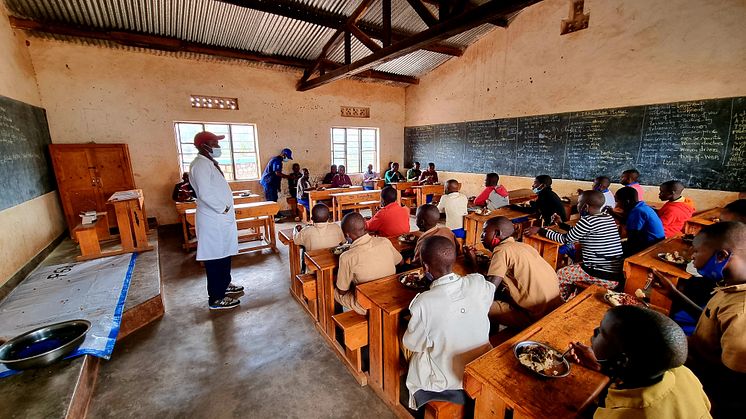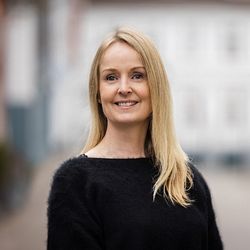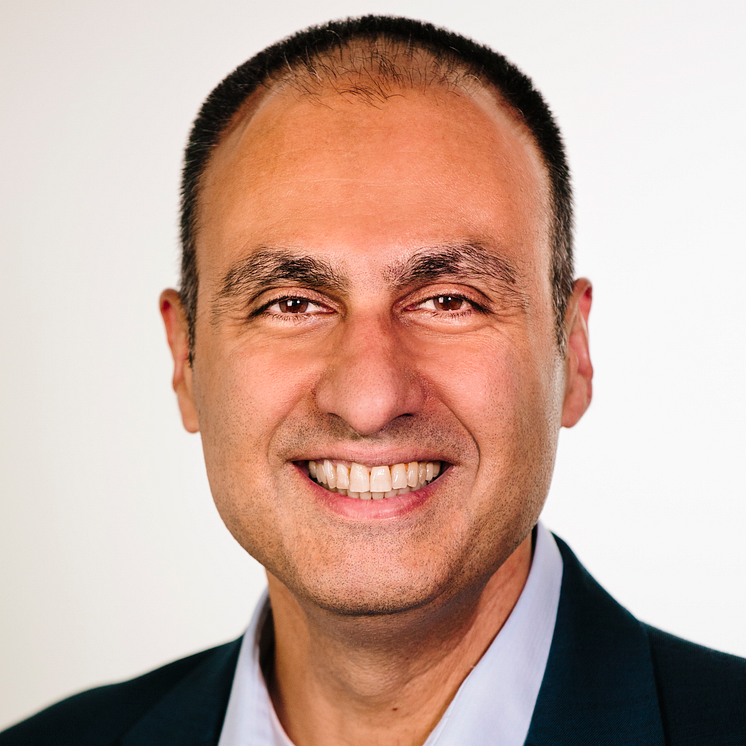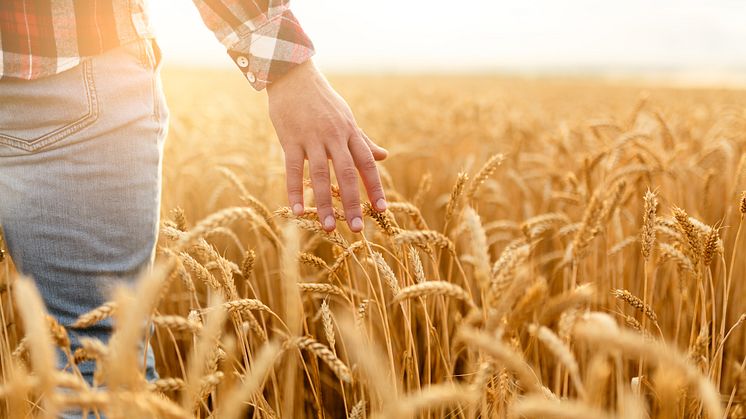
Nyhed -
Rwanda: 14.000 students choose whole maize flour
"Our global food system is failing to protect our health and the health of our planet. We can change this story!" says Peiman Milani from The Rockefeller Foundation. We met with Peiman Milani - an international development professional and food systems specialist from The Rockefeller Foundation. In the Danish Whole Grain Partnership we find great inspiration from the work done by Peiman Milani and The Rockefeller Foundation. Currently the foundation is working on a project in Rwanda - since July 2021, The Rockefeller Foundation, WFP, Vanguard Economics, and Gardens for health have been implementing a pilot in 18 schools serving nearly 14,000 students in which refined maize flour has been replaced with fortified whole maize flour with no budgetary impact. The early results of this collaboration are highly encouraging: children like the taste and aroma of the wholegrain product, teachers and school staff are supportive of the pilot, and the entire school community is aware of the nutritional benefits of fortified wholegrains. Read about the project and much more about how we can work together in more environmentally sustainable ways in this inspiring interview.
1. Short bio. Peiman Milani
Peiman Milani is an international development professional and food systems specialist with more than 20 years of leadership and technical experience. He has led multidisciplinary projects in East and West Africa, South and Southeast Asia, and the Americas. He is currently Director of the Food Initiative at The Rockefeller Foundation in Africa. He has also advised the World Food Programme on its food systems strategy in East Africa. Previously, he was the global lead for public-private partnerships and Rwanda country lead for Sight and Life Foundation. Prior to that, he was the director of Nutrition Innovation at PATH, where he led a 20-strong global multidisciplinary team dedicated to addressing malnutrition through novel approaches. Through his leadership, fortified rice became PATH’s first consumer product to break the 3-million consumer mark, was introduced in Myanmar, and gained scale-up momentum in India. His work has resulted in publications in the Stanford Social Innovation Review, the Annals of the New York Academy of Sciences, Frontiers in Microbiology, and other peer-reviewed journals. A Fulbright Scholar, Peiman holds an MSc from Arizona State University and an MBA from Duke University, and currently resides in Nairobi.
2. Who is the Rockefeller Foundation and what is the purpose of the foundation?
The Rockefeller Foundation’s mission—unchanged since 1913—is to promote the well-being of humanity throughout the world. Today the Foundation advances new frontiers of science, data, policy, and innovation to solve global challenges related to health, food, power, and economic mobility. As a science-driven philanthropy focused on building collaborative relationships with partners and grantees, The Rockefeller Foundation seeks to inspire and foster large-scale human impact that promotes the well-being of humanity by identifying and accelerating breakthrough solutions, ideas and conversations.
3. Tell us about the Rockefeller Foundation’s Food Initiative and why is it important
Our global food system is failing to protect our health and the health of our planet. It isn’t nutritious, it isn’t sustainable, and it isn’t equitable. The foods that are most readily available and affordable are slowly killing us, and some of the biggest environmental challenges we face are directly connected to our food system. Three billion people lack sufficient access to the healthy foods they need, and Covid-19 is putting over one hundred million more at risk of active hunger.
We can change this story. The food system can protect and improve our health, sustain and regenerate the environment, and be rebuilt with equity at its center. We can design a system that makes healthy diets affordable and accessible to everyone, and that delivers fair returns to the people who produce and provide our food.
The Rockefeller Foundation’s Food Initiative takes a whole-systems approach to sustainably and equitably nourish all people and the planet. Our vision is a global food system that affords every human being a diet rich in healthy foods and low in harmful foods, produced in environmentally sustainable ways.
4. Can you tell us about the new innovative pilot of whole grain maize meal grown in Rwanda? and what the experience with the project is so far?
Improving school meals is one of the best entry points for improving diets and shifting food systems. School feeding is the largest and most widespread institutional food procurement and service channel continuously reaching vulnerable populations globally – it is the world’s most extensive safety net. School feeding programs serve 388M children in all continents and regions and have significant impact on their school enrolment, learning outcomes, and nutrition status. They are potentially a powerful vehicle for changing how food is consumed, produced, and processed in a given country for the benefit of children, families, and farmers alike.
The primary barrier to improving school meals is cost. Government budgets were already over-stretched even before Covid. Even as we continue to advocate for increased school feeding budgets, we need to explore nutrition-positive, budget-neutral menu changes. Wholegrains are one such play. In serving refined flour foods to schoolchildren, we are in essence giving them the carbohydrate-rich, nutrient-poor part of grains, and directing the nutrient-dense parts to animals. The economics of wholegrains are such that, with a one-time investment, we can enable millers to produce, say, wholegrain maize meal at a lower cost than refined maize flour. That margin gain is sufficient to accommodate the small incremental cost of fortification, which is still important in low and middle income countries. Fortified wholegrain maize meal is thus richer in both macro and micronutrients than its refined counterpart – at no additional cost to schools.
We decided to test this proposition in Rwanda. Since July 2021, the Rockefeller Foundation, WFP, Vanguard Economics, and Gardens for Health have been implementing a pilot in 18 schools serving nearly 14,000 students in which refined maize flour has been replaced with fortified whole maize flour with no budgetary impact. The early results of this collaboration are highly encouraging: children like the taste and aroma of the wholegrain product, teachers and school staff are supportive of the pilot, and the entire school community is aware of the nutritional benefits of fortified wholegrains. Parents are inquiring about where they can buy the product, despite it not being commercially available yet. The government has signaled preliminary support, paving the way for the eventual scale-up of fortified wholegrain through the entire public school and early childhood center system, which we are currently planning.
5. What are the biggest challenges in creating a sustainable and healthier diet for all?
The current world order is deeply defective, and our food systems are reflective of that. Health, sustainability, and equity have historically not been the organizing principles upon which modern food systems have been built. In the 20th Century, we invested heavily in increasing staple food yields to improve food security, with the unintended consequence of evolving food systems optimized to unsustainably produce cheap empty calories. On the demand side, sophisticated marketing of unhealthy foods, including to children, has contributed to a global pandemic of obesity and deadly chronic diseases such as diabetes, cancer, and cardiovascular disease. Powerful vested interests have steered food systems and diets towards a slow and painful suicide through food by many millions around the world.
6. How do you see the future for creating a sustainable and healthier diets – what do you think are the important steps we need to take globally?
We need to embrace systems thinking in our approach to food and reimagine our food systems while identifying leverage points that can incrementally shift systems in a healthier, more sustainable, and equitable direction. We are all part of the food system, at least as consumers, and many of us are directly or indirectly involved in food production, processing, and distribution, so we all have a role to play through our daily decisions and actions. Institutions from all sectors, and governments in particular, need to rethink their approaches to food and show the leadership this critical juncture requires through instruments such as policy, science, innovation, and investment. There is no silver bullet, and no one can do it alone. We’re all in this together, and business as usual won’t work – we need a new attitude towards food and the biosphere, as well as towards each other, as members of one human race.



